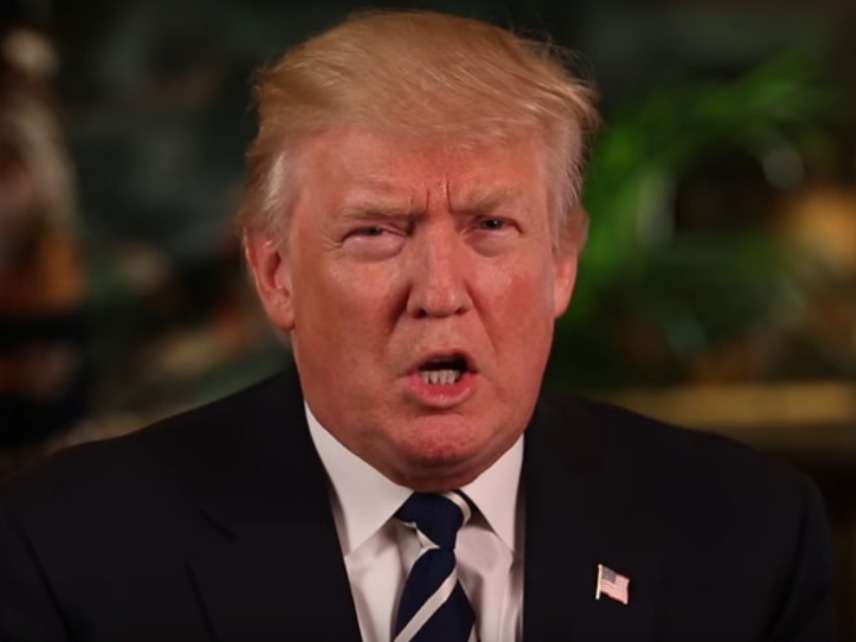By Trump's Logic, His Foot-Dragging on 'Extreme Vetting' Endangers Us All
An appeals court upholds an injunction against the president's travel ban but once again leaves him perfectly free to improve screening.

By upholding another injunction against President Trump's travel ban yesterday, the U.S. Court of Appeals for the 9th Circuit reinforced the impression that his attempts to protect Americans from terrorism have been stymied by unaccountable judges. The appeals court ruled that Trump's executive order exceeded his statutory authority because he did not make an evidence-based determination that admitting the people he wants to exclude would be "detrimental to the interests of the United States." Yet the same ruling eliminated the administration's last excuse for failing to impose the "extreme vetting" that Trump has been promising since his campaign.
When Trump issued his first executive order restricting entry into the country on January 27, he presented it as a temporary measure aimed at facilitating better screening procedures. "We will again be issuing visas to all countries once we are sure we have reviewed and implemented the most secure policies over the next 90 days," he said on Facebook. White House Press Secetary Sean Spicer likewise emphasized that the whole point was to "make sure that the people who are coming in are vetted properly." According to the order itself, the 90-day ban on travelers from seven Muslim-majority countries and the 120-day ban on refugees were supposed to give the administration time to "ensure that adequate standards are established to prevent infiltration by foreign terrorists or criminals." That was 137 days ago.
The first order instructed the secretary of homeland security, in consultation with the secretary of state and the director of national intelligence, to "immediately conduct a review to determine the information needed from any country to adjudicate any visa, admission, or other benefit under the [Immigration and Nationality Act] in order to determine that the individual seeking the benefit is who the individual claims to be and is not a security or public-safety threat." Although courts prevented the traveler and refugee bans from taking effect, the administration was still free to work on that review. Instead it focused on revising the executive order to address some of the concerns raised by critics and the courts.
The revised order, published on March 6, reiterated that the administration wants to "improve the screening and vetting protocols and procedures associated with the visa-issuance process and the [refugee program]." At that point there was no legal barrier to such improvements. That remained true until March 15, when Derrick Watson, a federal judge in Hawaii, issued a temporary restraining order (later converted into a preliminary injunction) that not only blocked the bans on travelers and refugees but impeded the internal review mandated by the order. Yesterday the 9th Circuit overturned the latter aspect of the injunction, saying Watson had overreached. "Although other unenjoined sections of [the executive order] permit interagency coordination to review vetting procedures," the appeals court said, "the district court nonetheless abused its discretion in enjoining the inward-facing tasks of Sections 2 and 6."
The upshot is that the administration is once again perfectly free to develop better screening procedures for travelers and refugees. But instead it is focused on convincing the Supreme Court to overturn the injunctions against the executive order.
Even allowing for the inhibiting impact of Watson's injunction, Trump has done remarkably little to improve admission standards he claims are dangerously lax. The New York Times notes that "the rules for admitting people from the six countries covered by the latest travel ban [who were also covered by the previous ban] have remained almost entirely unchanged."
Trump has argued that courts are endangering national security by blocking his travel ban. "Just cannot believe a judge would put our country in such peril," he tweeted in response to a February 3 ruling that blocked the original executive order. "If something happens blame him and court system. People pouring in. Bad!" The next day, Trump warned that "the threat from radical Islamic terrorism is very real," so "courts must act fast" to uphold his order. As the 9th Circuit recognized, the security rationale for the travel ban is actually very weak. But taking the president at his word, his foot-dragging on extreme vetting poses an unconscionable threat to all of us.


Show Comments (81)